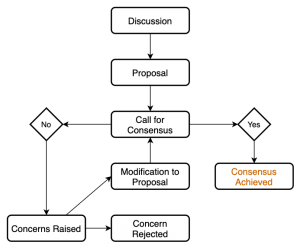Category:Consensus Definition

With the exception of matters of a constitutional nature, decisions regarding the type, nature, scope and details of work the OCF Collab Network undertakes are determined through a processes of consensus. The figure on the left illustrates the process. All work of the Network start with ideas that get vetted, tested against the scopes of the Network and workgroups and documented through a proposal that is made up of one or more Use Cases and Project Plans. Participation in developing a proposal MUST be transparent and inclusive to the extent that the members of the workgroup developing the proposal are fully engaged in its development.
When a workgroup chair or a facilitator deems a proposal sufficiently complete, there is a formal question asked to measure consensus. All engaged members are asked to "consent" if they approve, "stand aside" if they don't feel they can either consent or object, or "object". An objection is valid only if it is accompanied by a justification and an alternative that cures the objection.
If there are objections, there are two paths forward: (1) a modification to the proposal curing the objection is developed using the same transparent and inclusive process that resulted in the original proposal and a re-test of consensus is taken based on the modified proposal; or (2) there is an acceptable justification by those involved that : (a) the objection has been previously considered and rejected; or (b) the matter is out of scope; or (c) the matter is something that should be delayed for subsequent work.
It is only after all objections have been formally addressed and decisions recorded that a consensus can be declared. The key to this consensus process is that all voices are heard and all objections addressed.
- Even in rapid decision making contexts, minorities (the "minus") have the right to have dissenting opinion or negative outcome predictions recorded. [¶] If there is any single simple rule that defines what is not consensus decision-making, it is censoring the dissenting opinion. Regardless of how decisions are made, dissents are always recorded in all consensus decision making systems, if only so that accuracy of predictions can be examined later so the group can learn. - Wikpedia
Pages in category "Consensus Definition"
This category contains only the following page.